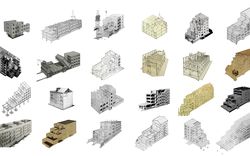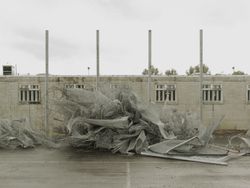In the Yesterday Today lecture series, American architect Michael Reynolds discusses Earthship houses, which use recycled materials and sustainable energy technologies to create autonomous dwellings. The structure and systems of Earthships are integrated so that all materials have a secondary use, from the greywater system in bathrooms and kitchens to planter boxes in(...)
Paul-Desmarais Theatre
15 November 2007
Michael Reynolds: The Earthship Sustainable Housing Concept
Actions:
Description:
In the Yesterday Today lecture series, American architect Michael Reynolds discusses Earthship houses, which use recycled materials and sustainable energy technologies to create autonomous dwellings. The structure and systems of Earthships are integrated so that all materials have a secondary use, from the greywater system in bathrooms and kitchens to planter boxes in(...)
Paul-Desmarais Theatre
The seminar will share research that documents and analyzes changes that took place inside rural homes since the collapse of the USSR in 1991, combining both fieldwork in Ukraine and select objects from the CCA Collection. Kateryna Malaia will shine a light on Ukrainian rural architecture at this critical moment, both for its ongoing survival and future development.
Study Room, CCA Keyword(s):
Research Fellowships Program, Research Fellow Seminar, mass-built rural housing, Ukraine
11 July 2024, 6pm to 7.30pm
Research Fellow Seminar: Rural Mass Housing in Ukraine
Actions:
Description:
The seminar will share research that documents and analyzes changes that took place inside rural homes since the collapse of the USSR in 1991, combining both fieldwork in Ukraine and select objects from the CCA Collection. Kateryna Malaia will shine a light on Ukrainian rural architecture at this critical moment, both for its ongoing survival and future development.
Study Room, CCA Keyword(s):
Research Fellowships Program, Research Fellow Seminar, mass-built rural housing, Ukraine
25 August 2011 to 23 July 2018, 6pm
Journeys and translation
20th century, Arkhitektura SSSR, béton, concrete, Cuba, CUJAE, Fidel Castro, Havane, Hugo Palmarola, hurricane Flora, Janet Abrams, Moscou, Moscow, Nikita Khrouchtchev, ouragan Flora, Pedro Ignacio Alonso, Salvador Allende, Santiago del Cuba, Soviet Union, Union soviétique, URSS, USSR, Viterbo O’Reilly, XXe siècle
17 June 2016
articles
17 June 2016
Journeys and translation
archives
Level of archival description:
Fonds
AP149
Synopsis:
The Minimum Cost Housing Group fonds documents the publications related to the research projects for low-cost housing and energy conservation undertaken by the Minimum Cost Housing Group of the McGill School of Architecture from the early 1970s to the early 2000s. The documents in the fonds consist of textual records, photographs and artefacts relating to over 20 of the group's publications, theses, research papers, offices records and reference material.
1947, 1970-2012
Minimum Cost Housing Group fonds
Actions:
AP149
Synopsis:
The Minimum Cost Housing Group fonds documents the publications related to the research projects for low-cost housing and energy conservation undertaken by the Minimum Cost Housing Group of the McGill School of Architecture from the early 1970s to the early 2000s. The documents in the fonds consist of textual records, photographs and artefacts relating to over 20 of the group's publications, theses, research papers, offices records and reference material.
archives
Level of archival description:
Fonds
1947, 1970-2012
archives
Level of archival description:
Fonds
AP065
archives
Level of archival description:
Fonds
Sub-series
AP149.S3.SS3
Description:
This sub-series documents the low-cost housing or sustaibable housing projects undertaken by Minimun Cost Housing Group, predominantly by Witold Rybczynski with his firm Housing Research. The material in this file was produced between 1974 and 2009 and includes correspondence with clients, research and notes for the project, and drawings, predominantly presentation drawings. The sub-series also includes some photographs of the projects.
1974-2009
Housing Competition and housing projects
Actions:
AP149.S3.SS3
Description:
This sub-series documents the low-cost housing or sustaibable housing projects undertaken by Minimun Cost Housing Group, predominantly by Witold Rybczynski with his firm Housing Research. The material in this file was produced between 1974 and 2009 and includes correspondence with clients, research and notes for the project, and drawings, predominantly presentation drawings. The sub-series also includes some photographs of the projects.
Sub-series
1974-2009
In 1929, Ilse Bing bought a Leica camera and started a photographic career that took her from Frankfurt to New York via Paris. While still in Frankfurt, she was commissioned by architect and urban planner Mart Stam to undertake a photographic survey of the modern buildings that were being erected in the city, including the Henry and Emma Budge-Heim H-block building. Built(...)
Hall cases
5 September 2013 to 5 December 2013
H-BLOCK: Social Housing – Ilse Bing
Actions:
Description:
In 1929, Ilse Bing bought a Leica camera and started a photographic career that took her from Frankfurt to New York via Paris. While still in Frankfurt, she was commissioned by architect and urban planner Mart Stam to undertake a photographic survey of the modern buildings that were being erected in the city, including the Henry and Emma Budge-Heim H-block building. Built(...)
Hall cases
The H-Block buildings of Maze Prison were a potent symbol of the often violent political struggles in Northern Ireland known today as the Troubles. The prison, opened in 1971 by the British government, was designed to keep apart warring loyalist and republican paramilitaries, the latter demanding to be treated as prisoners of war rather than criminals. As part of this(...)
Octagonal gallery
5 September 2013 to 12 January 2014
H-BLOCK: Prison Housing – Donovan Wylie
Actions:
Description:
The H-Block buildings of Maze Prison were a potent symbol of the often violent political struggles in Northern Ireland known today as the Troubles. The prison, opened in 1971 by the British government, was designed to keep apart warring loyalist and republican paramilitaries, the latter demanding to be treated as prisoners of war rather than criminals. As part of this(...)
Octagonal gallery





